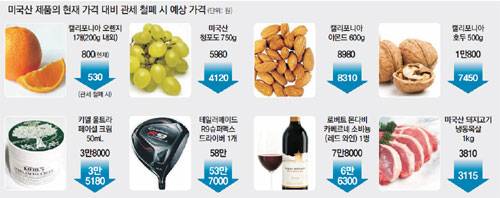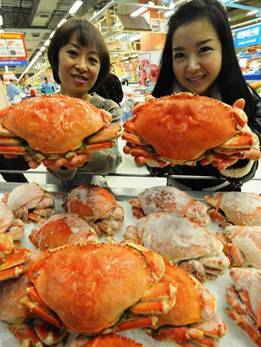
Market Information > 한국 농식품 시장뉴스
한국 농식품 시장뉴스
December 2010
2011.01.06
http://news.donga.com/Economy/3/01/2010
Summary: According to the Korean government official involved in the FTA negotiation with the
Public Survey Finds “44% Yes”, “27% No” to Ratification of KORUS FTA [Korean, OSY]
http://pann.news.nate.com/info/250204600
Summary: A public survey administered by RealMeter on Dec. 6 with 700 Korean adults found that 44 percent of respondents supported ratification of KORUS FTA by the Korean national assembly, while 27 percent opposed to ratification (29 percent replied “undecided”). However, 46 percent of respondents opposed to the results of additional negotiation, while 39 percent supported. In particular, people in 20’s through 40’s showed higher rate of disapproval on the outcome of additional negotiation. People in 50’s was the only group that showed higher approval rate on additional negotiation. White collar group showed higher approval rate (56 percent), while blue collar group showed higher disapproval (66 percent).
Largest Labor Union in the
http://news.mk.co.kr/v3/view.php?sc=3000000
Maekyung Economic Daily News, Dec. 10
Summary: AFL-CIO, the largest labor union in the
“Delay in Ratification of KORUS FTA will Expand Loss of Opportunity to Korea”, Gong-Il Sa, Head of KITA [Korean, OSY]
http://www.hankyung.com/news/app/newsview.php?
Hankyung Daily Economic Newspaper, Dec. 18
Summary: In a FTA seminar hosted by Korea International Trade Association (KITA) on Dec. 17, Gong-Il Sa, head of KITA, emphasized in his opening remarks that delay in ratification of KORUS FTA means loss of opportunity to
None
Beef, Pork Belly Cut Meat, Beer Are More Expensive in
http://economy.donga.com/0113/3/0113/2010
Summary: A recent report by Consumer Protection Agency indicated that among the 48 consumer products surveyed, 18 products were more expensive in
http://english.yonhapnews.co.kr/business/2010/12
Full text: The South Korean government confirmed on Tuesday a bird flu outbreak in a southwestern region of the country, a main winter habitat of migratory birds. The agricultural ministry said the state veterinary service confirmed that the bird flu virus was found in one of the blood samples sent from Iksan,
There are about 219 chicken farms and 13 duck farms in the specially designated area, according to government figures. "This case of bird influenza was found in a wild bird, so the virus may not have been spread to farm-raised poultry yet," a senior ministry official said, requesting anonymity.
12 Milk Companies Charged 19 Billion Won of Fine for Price Fixing [Korean, OSY]
http://www.ytn.co.kr/_ln/0102_201012191710282363
Summary: Fair Trade Committee announced on Dec. 19 that it has decided a total of 19 billion won of fine to 12 local milk producers for price fixing in September 2008. Fair Trade Committee’s report indicated that the price fixing had resulted in an increase of 11 to 19 percent of retail price.
Distribution History Labeling Mandated on Imported Beef from Dec. 22 [Korean, OSY]
http://www.yonhapnews.co.kr/economy/2010/12/21/
Summary: Imported beef has become subject to the distribution history labeling regulation on Dec. 22. As a result, all imported beef sold in
Gov’t to Introduce Preapproval System on Livestock Farms over 50 sq. Meters Next Year [Korean, OSY]
http://www.hankyung.com/news/app/newsview.php?aid
Summary: Ministry of Agriculture, Forestry, Fishery and Food (MIAFFF) reported to the president MB Lee on Dec. 27 that the ministry will introduce a preapproval system on local livestock farms over 50 sq. meters. The new regulation will also mandate sanitization control on all vehicles and people that visit the livestock farm. The farms will be required to keep a record of all visitors and sanitization history.
New Soju by Jinro Contains Only 15.5 Percent Alcohol and Targets Young Consumers [Korean, OSY]
http://www.hankyung.com/news/app/newsview.php?aid
Summary: Alcohol content of Soju has been lowered in recent years to target younger consumers. “Book Marks”, a new Soju launched by Jinro contains the least amount of alcohol, 15.5 percent. The market share of “weaker” soju products that contain less than 17 percent alcohol has shown a steep increase from 1.7 percent last year to 3.7 percent this year through the third quarter. Market analysts agree that expansion of weaker soju market has something to do with a significant shrink of Sake type rice wine sales in recent years. The volume of Sake type rice wine sales has shown a sharp decline from 400,000 cases per month 10 years ago down to 150,000 cases a month these days.
Shinsegae E-Mart Hires Ex-Sam’s Club Purchasing Director as Executive Officer for International Product Purchasing Division [Korean, OSY]
http://economy.donga.com/Economy_RealTime/3/01
Summary: Shinsegae E-Mart announced on Dec. 1 that it hired Christopher Kellerhan as the head of its international purchasing division. Mr. Kellerhan worked in Wal-Mart and Sam’s Club as the purchasing director.
Price War between E-Mart and COSTCO Slashes Price of Sin-Ra-Myon (Popular Instant Noodle Brand) to Half of Regular Market Price in Ten Days [Korean, OSY]
http://www.hankyung.com/news/app/newsview.php?aid
Summary: The price war exchanged between Shinsegae E-Mart store and COSTCO store in Yangjae-dong area Seoul has reduced the retail price of Sin-Ra-Myon, a leading instant noodle product, down to 8,790 won per box (30 packs of noodles in a box) on Dec. 4, which was about a half of the regular retail price. Observers agree that the two stores may continue the chicken game for some time to come because both stores are fighting to be the price leader in the target market.
Effects of KORUS FTA on Consumers:
Robert Mondavi Cabernet Sauvignon: 78,000 > 66,300 Won (bottle)
[Korean, OSY]
http://economy.donga.com/Economy_RealTime/3/01/2010
Summary: As

Instant Noodle Industry Under Cost Pressure due to Surging International Price of Palm Oil and Wheat [Korean, OSY]
http://www.hankyung.com/news/app/newsview.php?aid
Summary: International prices of key ingredients, such as wheat and palm oil, have surged to a record high level. Price of wheat in Chicago CME market marked $7.93 per bushel on Dec. 6, 14.84 percent higher than one week before. Price of palm oil in
Burger King Raises Prices of Hamburgers by 200 Won Each [Korean, OSY]
http://finance.daum.net/news/finance/all/MD201012
Summary: Burger King has raised prices of all hamburger menus by 200 won on Dec. 8. For example, Whopper set menu price was raised from 6,300 won to 6,500 won. Depending on the previous price, the increase was as high as 9 percent of the previous price. Burger King explained that increased cost of raw ingredients, in particular vegetables and soda beverages, were the cause of the price increase.
Lotte Mart Withdraws from Low Price Fried Chicken Business [Korean, OSY]
http://news.donga.com/Society/3/03/20101214/33267846/1
Summary: Lotte Mart, the third largest hypermarket chain in
Lotte Mart to Open Its 80th Store in
http://www.yonhapnews.co.kr/economy/2010/12/17/0318
Summary: Lotte Mart, the third largest hypermarket retail chain in
Harvests of Local Cabbage, Radish, and Beans Decline 25 Percent This Year [Korean, OSY]
http://www.yonhapnews.co.kr/economy/2010/12/21/
Summary: According to the report by National Statistics Office, harvests of local agricultural products in general showed a significant decline this year. Harvest of winter cabbage this year marked 1.2 million tons, down 25 percent from last year. Winter radish harvest also declined 24 percent from last year to 0.47 million tons. Harvest of other products also declined: beans (105,000 tons, 24 percent down), Korean pear (308,000 tons, 25 percent down), and apple (460,000 tons, 7 percent down).
Gov’t to Lower Import Tariffs on 67 Products to Stabilize Consumer Price [Korean, OSY]
http://www.yonhapnews.co.kr/economy/2010/12/20/030100
Summary: Ministry of Planning & Finance announced on Dec. 21 a list of 67 products that will be subject to temporary import tariff reduction in the coming year. The reduction will be as high as 40 percent point off the regular tariff rates. Import tariffs on 22 products, including table sugar, raw brown sugar, multi-vitamins, wheat, cookies, and garlic, will be lowered during the first half of next year. Import tariffs on 45 products, including feed corn, will be lowered during the full year 2011. On the other hand, the gov’t also announced a list of 15 products, including frozen Pollack, frozen Saury, frozen Basilewsky, Pyogo mushrooms, fermented shrimp, that will be subject to up to 100 percent increase in import tariffs in 2011 to protect local industries.
CJ Raises Table Sugar Price 9.7% [Korean, OSY]
http://www.yonhapnews.co.kr/economy/2010/12/22/0318
Summary: Cj JeilJedang, the leading table sugar processor in
Sales of Blended Whiskeys Plunges [Korean, OSY]
http://www.hankyung.com/news/app/newsview.php?aid
Summary: Sales of blended whiskey brands, such as J&B and Cutty Sark, have declined 30 percent over the last five years in
“Baby Boomers, Working Moms, Fashion-sensitive Male”, Three Leading Consumers of Department Stores This Year [Korean, OSY]
http://www.yonhapnews.co.kr/economy/2010/12/24/03
Summary: Lotte Department Store, the leading department store chain in
Department Stores Kick Off Lunar New Year’s Day Gift Set Reservations [Korean, OSY]
http://asiae.co.kr/news/view.htm?idxno=20101226
Summary: Leading department stores have started to offer customers reservations for Lunar new year’s day gifts sets on Dec. 27. The Lunar new year’s day for year 2011 is Feb. 3. Department stores have distributed gift set catalogs via mails and opened designated desks in the store to attract customers. Lunar new year’s day is one of the largest shopping season of the year in
http://www.yonhapnews.co.kr/economy/2010/12/01
Summary: Ministry of Ag., Fishery, Forestry and Food (MIAFFF) announced on Dec. 1 that
Instant Noodle Industry Under Cost Pressure due to Surging International Price of Palm Oil and Wheat [Korean, OSY]
http://www.hankyung.com/news/app/newsview.php?aid
Summary: International prices of key ingredients, such as wheat and palm oil, have surged to a record high level. Price of wheat in Chicago CME market marked $7.93 per bushel on Dec. 6, 14.84 percent higher than one week before. Price of palm oil in
“Crabs from
http://www.hankyung.com/news/app/newsview.php?type
Summary: HomePlus, the second largest hypermarket store chain in

Population of
http://www.hankyung.com/news/app/newsview.php?aid
Summary: The national census survey, which is administered every five year, found that there were a total of 48.2 million Koreans living in
Supply of Jeju Tangerine Drops 30 Percent from Last Year [Korean, OSY]
http://www.hankyung.com/news/app/newsview.php?aid
Summary: According to Agro-Fishery Marketing Corporation (aT), price of Jeju tangerine in major wholesale markets rose to 29,400 won per 15 kg box on Dec. 28, up 53.9 percent from last year. Supply of Jeju tangerine in the market has declined by 30 percent this year compared to last year due to the poor harvest. Total harvest of tangerine in Jeju island so far this year has amounted to 239,000 tons, down 31.5 percent from last year. Tangerine production in Jeju island has historically shown a two year tidal pattern, the year of poor harvest following the year of good harvest.
The information in this report was compiled by the Agricultural Trade Office (ATO) at the U.S. Embassy in Seoul, South Korea. The press summaries contained herein do NOT reflect USDA, the U.S. Embassy, or other U.S. government agency official policy or view point. U.S. food exporters can learn more about market opportunities in South Korea by reviewing ATO Seoul’s Exporter Guide and other reports available at www.fas.usda.gov by clicking on “attaché reports”.
Agricultural Trade Office, U.S. Embassy - Seoul
Tel: 82-2-6951-6848 Fax: 82-2-720-7921
Email: atoseoul@usda.gov